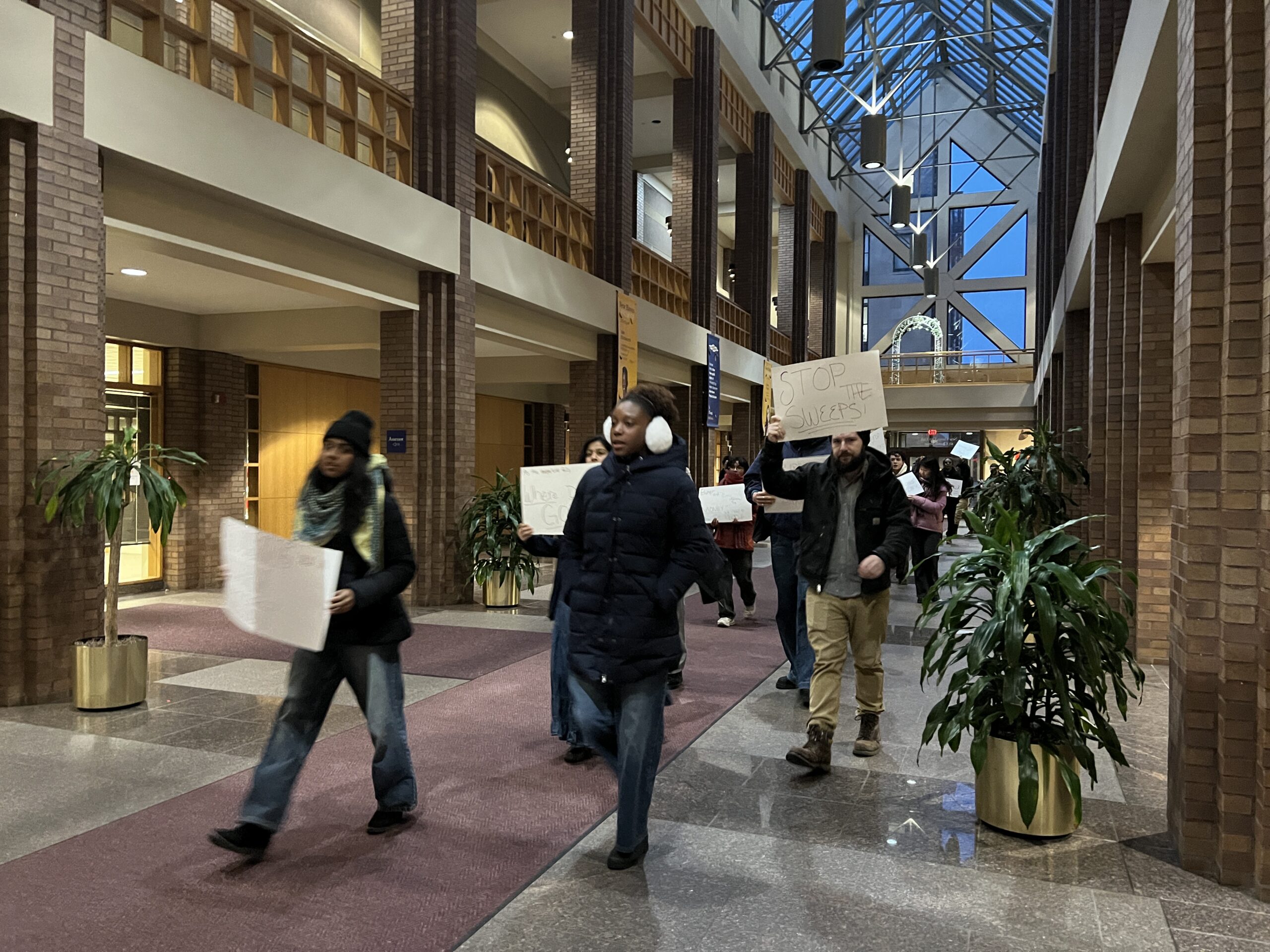New Haveners, Yale students occupy City Hall in protest of encampment sweeps
Members of the Unhoused Activists Community Team marched through City Hall, demanding that New Haven adopt better policies regarding the treatment of its unhoused citizens.

Lily Belle Poling, Contributing Photographer
Protesters gathered in City Hall Thursday evening to demand changes to New Haven’s policies toward homeless encampments — comparing Mayor Justin Elicker to President-elect Donald Trump and bringing a tent to the second floor of City Hall.
According to the Unhoused Activists Community Team, or U-ACT, the city has shortened the time it gives encampments to vacate premises after notification of sweeping from 72 hours to none at all. Elicker denied any changes to the city’s policy and ensured that city officials provide at least 72 hours’ warning before clearing any encampments.
“We have an inauguration coming up next week, and I think [Elicker] feels emboldened,” Mark Colville, the lead organizer of U-ACT, said. “I think he feels like he can do whatever the hell he wants now.”
Colville also expressed frustrations about Elicker’s decision to shut off electricity in Rosette Village — a collection of tiny homes for unhoused individuals associated with U-ACT — this past summer on the hottest day of the year, threatening two residents relying on Rosette Village’s electricity for CPAP machines.
Thursday’s demonstration followed multiple clearings of a previous encampment that was established on the Green in October in protest of the city’s sweeps. Multiple participants were arrested for refusing to remove their tents, and others reported having their personal belongings confiscated by city officials.
“I was almost dumbfounded by some of the stuff that they were saying,” Elicker said after listening to the activists’ speeches. “That kind of rhetoric is just unbelievably in opposition to everything we stand for as a city.”
Elicker cited New Haven’s recent additions of shelters and warming centers, including the purchase of a Days Inn that was transformed into a shelter.
He added that the best way to make progress will be for the city to collaborate with groups like U-ACT, rather than U-ACT “demonizing” City Hall. He felt that their energy and advocacy could greatly contribute to the city’s support of the unhoused community, including its campaign to get more state funding for shelters and affordable housing.
“We do so much, and we do it really compassionately,” he said. “So to hear the kind of rhetoric and criticism that folks just said is really hurtful because there are many people in this building that really, really care about doing the right thing and supporting the unhoused community.”
At City Hall, activists also expressed concerns about warming centers reaching capacity and individuals being turned away as winter temperatures climb lower. They called on the city to create more affordable housing units and to allow encampments in public spaces rather than relying on shelters or warming centers.
In response to these concerns, Elicker said that shelters and warming centers won’t turn anyone away during “cold weather emergencies.”
Sean Gargamelli-McCreight, another U-ACT organizer, explained that Thursday’s occupation gave unhoused individuals an opportunity to stay warm and participate in a community space.
“We’re here to hold this space for all those in the city of New Haven who have been evicted, displaced … and make a statement that they are people who deserve dignity, privacy and the ability to maintain a home in safety without threat from criminalization,” Gargamelli-McCreight said.
Tehuti-Mesmultulu Kiah, who attended the protest, said that the Rosette Village took care of him when he had nowhere to go, so he decided to support them at the protest.
Sidetracked on his way to Baltimore, Kiah was treated for a leg tumor at Yale New Haven Hospital. After not receiving respite time, he left the hospital and took refuge on the New Haven Green. Like many others, Kiah turned to the Rosette Village, where Colville has set up tiny homes for unhoused New Haveners.
Roughly 25 Yale students in U-ACT attended the protest. Student organizers highlighted Yale’s role in perpetuating the housing crisis, citing its billions of dollars in tax-exempt properties throughout New Haven.
“We all just really want to affirm that we really strongly believe that housing is a human right,” Arjun Warrior ’26 said. “People have the right to construct alternate forms of shelter … and we really just want to say that it’s such a shame and a pity and a disgrace that, instead of working to support our unhoused residents, the solution consistently has been to evict them.”
Students also drew parallels between the city’s encampment sweep and Yale’s removal of pro-Palestine student encampments in April 2024, which resulted in 47 arrests. Clearing encampments, Elicker “is literally calling for community members to die,” Ishikaa Kothari ’25 said.
Students also thanked U-ACT and New Haven community members for supporting the protests in spring.
After the demonstration concluded, protestors briefly brushed with security personnel as they brought a tent to the second floor of City Hall, where Elicker’s office is located.
Outside City Hall, activists distributed hot food and coffee to community members. Colville made sure to include the previously opposed police officers on site, clarifying that they were always welcome to get food and drinks.
“This is our tribe right here,” said Savage. “The true tribe of the heartbeat of the place that stands right here in this building today, we generate the wealth of community within each other. This is our tribe.”
The first U-ACT tents were cleared from the Green on Oct. 17, 2024.
Interested in getting more news about New Haven? Join our newsletter!







